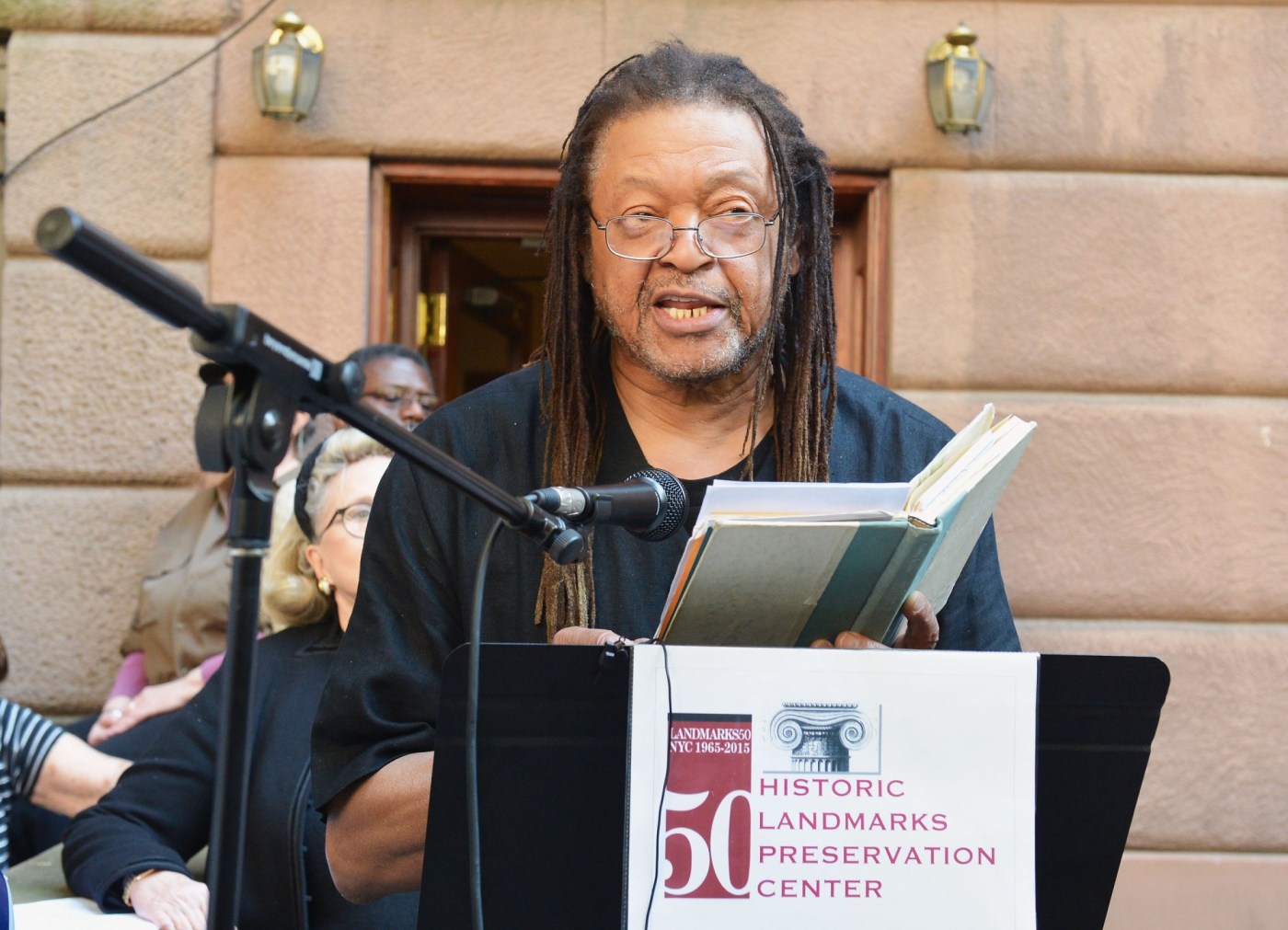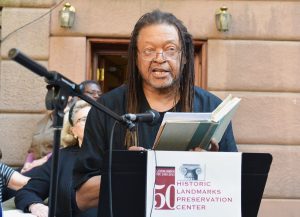
Quincy Troupe nearly punched Miles Davis. Then he co-wrote the jazz icon’s biography
Back in the 1980s, Spin magazine asked Quincy Troupe who he’d like to write about and the poet and journalist didn’t hesitate to answer.
“I said I’d like to write about Miles Davis,” Troupe, 83, says on a recent phone call from his home in New York City. “Because he’s from East St. Louis, I’m from St. Louis. He played in my cousin’s band in St. Louis. So I would really like to write about him.”
Soon after, Troupe found himself on the legendary jazz trumpeter’s doorstep.
“When I walked in, he looked at me and he said in that voice he had, ‘You know, you’re a strange-looking (fellow). Boy, you’re weird,’” Troupe says in an excellent impression of Davis’s hoarse whisper.
“I said, ‘You’re weird-lookin’ yourself.’ I told him just like that.
“He said … ‘Man, you better shut up. I’ll hit you in your mouth,’” Troupe continues. “And I said, ‘Miles, you look at yourself recently? I’m 6’2″ I weigh 200 pounds. You’re 5’7″, 5’8” and you weigh 150 pounds. I’ll hurt you. I’ll hit you in your mouth; you’ll never play again.’
“I said, ‘Don’t threaten me, man. I’m from St. Louis, you’re from East St. Louis. You should know better.’”
(For the record, this is neither standard nor recommended interview practice in journalism.)
Once Davis learned that Troupe was the cousin of a former bandmate, all was well, Troupe says. “He kind of smiled and said, ‘Don’t sit there like a knot on a log. Ask me a question.’
“I had all these questions mapped out, including about his style and his clothes,” Troupe says. “He liked my shoes. I had these great shoes. He said, ‘Them’s some great shoes you got on.’ And that’s how it started, just like that.”
Troupe asked a lot of questions, first for an in-depth, two-part Spin article, and a few years later, as co-writer of “Miles: The Autobiography,” which won an American Book Award after its publication in 1989.
Troupe was a member of the Watts Writers Workshop in the mid-’60s, and taught at the University of California, San Diego for a dozen years in the ’80s and early ’00s. He was appointed California’s first official poet laureate in 2002, resigning when it came to light he had attended, but not graduated, from Grambling College. In 2006, he collaborated with Chris Gardner on “The Pursuit of Happyness,” which was turned into a Will Smith film.
Now Troupe is taking a break from work on a memoir to return to Southern California as one of three 2024 recipients of the LA Review of Books – UCR Department of Creative Writing Lifetime Achievement Award.
“I’ve had many awards in the past, but this has made me really happy because it’s a lifetime achievement award,” Troupe says. “I used to live in California, so coming back out there, it’s very good.”
He and fellow honorees Dave Eggers and Rigoberto González will be honored during the 47th annual UCR Writers Week Festival, held Feb. 10 and Feb. 12-16 at the University of California, Riverside.
In an interview edited for length and clarity, Troupe talked about how he embraced poetry while playing basketball in France, befriended Miles Davis, joined the Watts Writers Workshop in the ’60s, and more.
Q: I want to ask you about when you started taking your first steps toward becoming a writer.
A: My mother always had books around the house because she was a big reader. My father was a great baseball player, so I wasn’t thinking about being a writer at first because I was an athlete. I went to Grambling College on an athletic scholarship, a baseball and basketball scholarship. Then I went into the Army and played basketball in Europe on the Army team until I wrecked my knee.
I started writing poems. I went to France and I met this young woman over there. She was at the Sorbonne. Then I started to write these poems. I don’t know why I started, because I never thought about writing poetry. It just happened. It’s hard to explain.
Q: What kinds of poems were they? Do you remember the first poems you wrote?
A: Somehow when I was over there I got a book by Pablo Neruda and (also Federico) Garcia Lorca. They really, really influenced me a lot. I didn’t know anything about Chile and I had been to Spain when I was playing basketball. I just loved the way the Latin poets wrote, and so I started to imitate them when I was over there. And T.S. Eliot because I found out he was from St. Louis.
Q: Talk about the influence of music, jazz and Miles Davis in particular, had on you as a writer.
A: My mother really liked jazz. She was married to a musician and she always had music around the house. And so I started listening to Miles Davis’s music, and I really loved the music. I had no idea he was going to influence me as a poet. I also didn’t know I was ever going to meet him. I just loved his music,
At one time, I wanted to learn how to play trumpet. My brother was a drummer, played drums for Lou Rawls. So I was in kind of a musical situation, being with my brother and listening to music all the time.
Q: Let’s jump ahead to the late ’80s: How did the Spin magazine articles lead you to writing ‘Miles: The Autobiography’?
A: You know, he picked me. Everybody thought he’s gonna pick Leonard Feather or some other jazz writer he knew. So when they asked him who he wanted to write his book, he said, ‘I want Quincy Troupe.’ They said, ‘But he’s a poet.’ He said, ‘You didn’t ask me what he was. You asked me who I wanted to write my book,’ and the guy says, ‘Oh, yeah, OK, OK.
I was sitting in my apartment, phone call came in. I can’t think of his name now, because I’m getting older and I’m forgetting names. He said, ‘Miles Davis just gave you first’ – he was from Simon & Schuster, the editor – ‘first right of refusal to write his life story.’
I said, ‘Are you kidding? He asked for me to write his life story?’ and they said, ‘Yeah.’ I said, ‘Of course, I’d like to write his life story. How much money is it, man? I have kids.’ And he laughed, he laughed. He said, ‘That’s funny.’ I said, ‘Sure, I’d love to.’
Q: That must have taken a lot of conversations to get all the stories for the autobiography.
A: At the time, Miles was living in Malibu. So I flew out there, got a car, and drove out to his house. He was sitting – I’ll never forget it – he was sitting on his veranda, and his house was looking right at the ocean. His butler let me in and I walked out there. I remember when I walked in, he looked at me, and he says, ‘Yeah, yeah, I got you a gig, (mister). A real good gig.’
I said, ‘Yeah, well, thanks, man; thank you very much. He said, ‘Sit down, sit down. What you wanna know? I had all these questions ready. He said, ‘Why’d you ask me that?’ I said, ‘Because you picked me to write the book. I gotta know all this stuff.’ And he just laughed.
And so we just hit off. I guess it was that I was from St. Louis and he was from East St. Louis and he trusted me. He liked the way I wrote, and I didn’t take anything off of him. As much as I loved him, I wasn’t gonna let him mess me over. He knew that I was gonna tell him the truth about everything.
Q: I want to ask about the Watts Writers Workshop, which must have been a fertile creative community of writers in L.A. in the ’60s.
A: Well, it was a remarkable thing. When I moved to California, I was with this lady from St. Louis. We broke up at a certain point and I joined the Watts Writers Workshop because I wanted to get in with a group of writers. And they all lived out there in this house called the House of Respect. When I went out there, there was Ojenke, Cleveland Sims, and this woman I was going with at the time, Pamela Donegan.
So I asked Ojenke, ‘You think I can move out here,’ and they said, ‘Yeah.’ I lived in this one room, right behind the driveway. Cleveland Sims had the biggest room. Ojenke had a room, but he also stayed with his parents. Leumas Sirrah came by, whose name was Samuel Harris spelled backwards. He would sit up on the roof and write poems and I just thought he was the weirdest person I had ever seen.
It was really interesting to walk around Watts and run into everybody there and just hang out. Then we would have these conversations at night, and everybody would critique everybody’s poetry. My friend Cleveland Sims, I read this poem, and he said, ‘Let me see it.’ So I gave it to him, and Cleveland – he was a tall, dark guy, crazy as hell – he threw my poem out the window.
I said, ‘What? What did you do?’ He said, ‘This is a ridiculous poem.’ And I jumped up. I said, ‘Man, hey, don’t mess me with like that.’ He said, ‘What are you gonna do?’ I said, ‘We can go down, I don’t be taking no stupid stuff of nobody, man.’ He just laughed. He said, ‘Aw, sit down, man, we don’t have to fight over the thing.’ I said, “I wasn’t thinking about fighting. I was thinking about hurting you, man.’
He just laughed. Ojenke started laughing, everybody was laughing.

